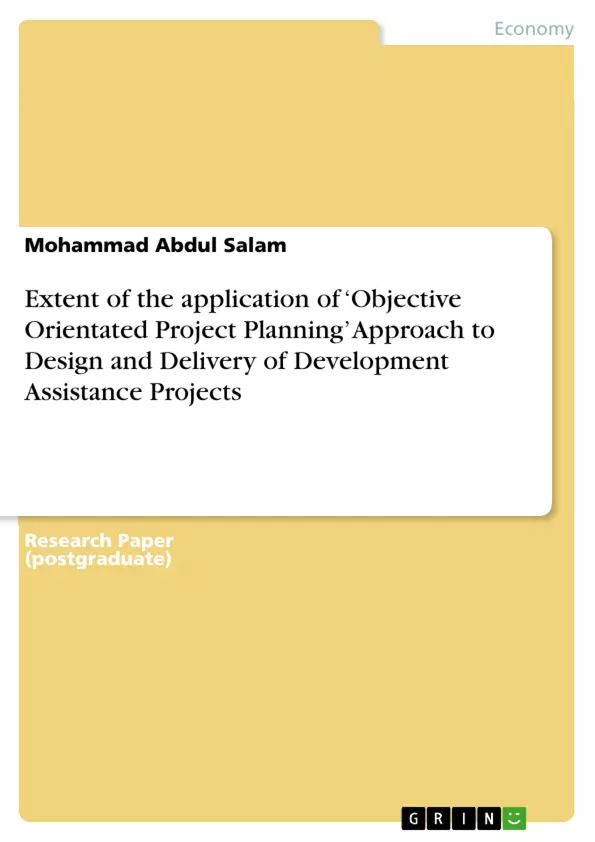A development project is based on its contribution, on definite events, and on production which are projected to add to the preferred purposes and ultimate goal. The aims of the development assistance projects are poverty alleviation, improvement of living standards, environment protection, human rights protection etc. The rationale of development projects is to persuade transform whose consequences are most wanted within the limited scope. The main idea of this research is to assess the application of the OOPP approach for contributing the design and delivery of development assistance projects. The report covers the logical steps of OOPP approach and stages of project design with a conceptual framework, the critical assessment of extent of OOPP approach for design and delivery, and the criticisms of OOPP approach in development assistance project planning and execution.
Inhaltsverzeichnis (Table of Contents)
- INTRODUCTION
- OOPP: THEORY AND CONCEPT
- OOPP APPROACH: CRITICAL ASSESSMENT
- OOPP: CRITICISMS AND PROPOSITIONS
- CONCLUSION
- REFERENCES
- APPENDIX
Zielsetzung und Themenschwerpunkte (Objectives and Key Themes)
This assignment aims to evaluate the application of the Objective-Oriented Project Planning (OOPP) approach in the design and delivery of development assistance projects. It explores the logical steps of the OOPP approach, the stages of project design with a conceptual framework, a critical assessment of the extent of the OOPP approach for design and delivery, and the criticisms of the OOPP approach in development assistance project planning and execution.- The theory and concept of the OOPP approach
- The critical assessment of the extent of the OOPP approach for design and delivery
- The criticisms of the OOPP approach in development assistance project planning and execution
- The role of stakeholder participation in the OOPP approach
- The contribution of the OOPP approach to project design and delivery
Zusammenfassung der Kapitel (Chapter Summaries)
The INTRODUCTION provides a context for development assistance projects, highlighting their importance in supporting emerging countries and addressing poverty alleviation, environmental protection, and human rights. The chapter discusses the need for effective planning, design, and management methods to facilitate the livelihood upgrading of poor communities.
The OOPP: THEORY AND CONCEPT section explores the concept of Objective-Oriented Project Planning (OOPP) as a contributory planning procedure that involves all stakeholders in identifying and analyzing problems, designing projects, and developing pragmatic plans. It details the different steps of the OOPP approach, including participation analysis, problem analysis, objective analysis, alternative analysis, and the Logical Framework. This section also explores the project life-cycle and project design within the OOPP framework, drawing on the contributions of various organizations, including ILO and USAID.
The OOPP APPROACH: CRITICAL ASSESSMENT section delves into the extent of the OOPP approach in project implementation and delivery. It highlights the importance of project design for effective implementation and the critical role of stakeholder consultation, particularly in the identification of project objectives through problem analysis. The chapter presents a conceptual framework illustrating the application of the OOPP approach in project design and delivery, encompassing the stages from situation analysis to planning matrix, project identification, project formulation, and project delivery.
Schlüsselwörter (Keywords)
The primary focus of this text is on the Objective-Oriented Project Planning (OOPP) approach, examining its application in the context of development assistance projects. Key terms include: project planning, development assistance, stakeholder participation, problem analysis, objective analysis, alternative analysis, Logical Framework, project design, project delivery, and project management.Frequently Asked Questions
What is the Objective-Oriented Project Planning (OOPP) approach?
OOPP is a participatory planning procedure used in development assistance to involve stakeholders in problem analysis, objective setting, and creating pragmatic project plans.
What are the main stages of the OOPP methodology?
The stages include participation analysis, problem analysis, objective analysis, alternative analysis, and the development of a Logical Framework (LogFrame).
Why is stakeholder participation crucial in OOPP?
Participation ensures that all relevant parties contribute to identifying problems and designing solutions, which improves the effectiveness and sustainability of development projects.
What are some criticisms of the OOPP approach?
Critics often point to the complexity of the execution, potential for rigid planning, and the challenges of ensuring genuine participation in diverse cultural contexts.
How does OOPP contribute to poverty alleviation?
By providing a structured yet participatory framework, it helps design projects that specifically target the needs of poor communities and improve their living standards.
What is the role of the Logical Framework in OOPP?
The Logical Framework serves as a planning matrix that summarizes the project's goals, activities, indicators, and assumptions in a clear, structured format.
- Arbeit zitieren
- M Sc Mohammad Abdul Salam (Autor:in), 2015, Extent of the application of ‘Objective Orientated Project Planning’ Approach to Design and Delivery of Development Assistance Projects, München, GRIN Verlag, https://www.grin.com/document/292640



